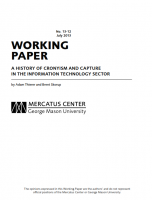There is bipartisan agreement that the 1996 Telecom Act was antiquated only shortly after President Clinton’s signature had dried on the legislation. There is also consensus that spectrum policy, still largely grounded in the 1934 communications statute, absolutely distorts today’s wireless markets. And there is frequent criticism from thought leaders, right and left, that the FCC has been, for decades, too accommodating to the firms it regulates and too beholden to the status quo (economist Thomas Hazlett quips the agency’s initials stand for “Forever Captured by Corporations”).
For these reasons, members of Congress every few years announce their intention to reform the 1934 and 1996 communications laws and modernize the FCC. Yesterday, some powerful House members unexpectedly reignited hopes that Congress would overhaul our telecom, broadband, and video laws. In a Google Hangout (!), Reps. Fred Upton and Greg Walden said they wanted to take on the ambitious task of passing a new law in 2015.
Much depends on next year’s elections and the composition of Congress, but hopefully the announcement spurs a major re-write that eliminates regulatory distortions in communications, much as airlines and transportation were deregulated in the 1970s–an effort led by reformist Democrats.
About ten years ago, more than fifty scholars and technologists crafted reports which constituted the Digital Age Communications Act (or DACA) that is largely deregulatory (a majority of the group had served in Democratic administrations, interestingly enough). In 2005, then-Sen. Jim DeMint proposed a bill similar to the working group’s proposals. The working group’s recommendations aged very well in eight years–which you can’t say about the 1996 Act–and represents a great starting point for future legislation.
As Adam has said the DACA reports have five primary reform objectives:
– Replacing the amorphous “public interest” standard with a consumer welfare standard, which is more well-established in field of antitrust law
– Eliminate regulatory silos and level the playing field through deregulation
– Comprehensively reform spectrum not just through more auctioning but through clear property rights
– Reform universal service by either voucherizing it or devolving it to the States and let them run their own telecom welfare programs; and
– Significantly reforming & downsizing the scope of the FCC’s power of the modern information economy
DACA redefines the FCC as a specialized competition agency for the communications sector. The FCC largely sees itself as a competition agency today but the current statutes don’t represent that gradual change in purpose. The FCC is slow, arbitrary, Balkanizes industries artificially, and attempts to regulate in areas it isn’t equipped to regulate–the agency has a notoriously bad record in federal courts. These characteristics create a poor environment for substantial investments in technology and communications infrastructure. The DACA proposals aren’t perfect but it is a resilient framework that minimizes the effect of special interests in communications and encourages investments that improve consumers’ lives.




 The Technology Liberation Front is the tech policy blog dedicated to keeping politicians' hands off the 'net and everything else related to technology.
The Technology Liberation Front is the tech policy blog dedicated to keeping politicians' hands off the 'net and everything else related to technology.